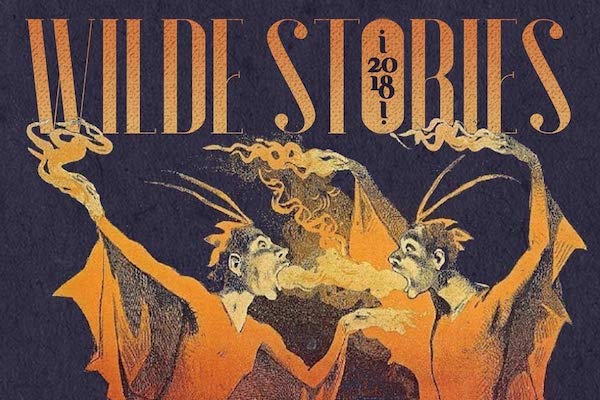‘Wilde Stories 2018: The Year’s Best Gay Speculative Fiction’ Edited by Steve Berman

Author: Jeff Baker
November 26, 2018
This multifaceted and inclusive edition of Wilde Stories, edited by Steve Berman from Lethe Press and featuring “the year’s best gay speculative fiction,” is memorable from cover to cover. The cover itself, by Inkspiral Design, is based on a French Folies-Bergere poster from decades earlier, and it captures the feel of this final edition of the anthology: whimsy, darkness, and the fantastic.
The book opens with the following memorable line, from Joseph Keckler’s “Ghost Sex”: “I am not saying I believe in ghosts at all, but I did have sex with one.” Keckler’s story plays out like a brief, funny anecdote (complete with a reference to the old horror soap Dark Shadows), and is a fun way to begin the collection, in which each story includes gay men as pivotal–though not always human–characters.
Other highlights include:
- “Making the Magic Lightning Strike Me” by John Chu starts out as a riff on Mission Impossible-type movies and becomes a rumination on the narrator not feeling perfect even after incredible physical augmentation.
- Matthew Bright’s “The Library of Lost Things,” set in that staple of fantasy, the magical library, catalogues books that are unfinished. Tending this collection comes with a warning, something the new Indexer, Tom, does not heed. A clever story with a discreet reference to writer “S. Berman.”
- In “Serving Fish” by Christopher Caldwell, Eric is ten years old when he catches a talking fish who pleads for its life, offering magic as a reward. But with “a cost.” The story follows Eric through the years as he calls upon the flounder’s aid, and as he experiences the cost.
- “Cracks” by Xen takes place in a world of the “Nightsiders,” who live by night, and “Daysiders,” who live in the daylight. Young brothers Tarif and Asad are Nightsiders; after school they patrol their darkened neighborhood to defend against a kind of darkness that sucks people into “cracks,” which supposedly destroy them and spit them out. The brothers regard themselves as superheroes with the responsibility of preventing their city from going into the darkness, which just swallowed Louisville. When Asad catches a glimpse into another Earth and sees himself with another man, it only increases his loneliness. The ending of this apocalyptic story manages to be upbeat without being contrived.
- Valentin has been implanted with a device that lets him control a nanoshadow in Rich Larson’s “There Used to Be Olive Trees.” And he is only sixteen. The nanoshadow augments his own abilities. (“A live shadow…Thought they were only in tales,” a character says.) This is in a world of supposed prophets and gods, but of course, not all is as it seems.
- “The Future of Hunger in the Age of Programmable Matter” by Sam J. Miller is set in a future world where the new technological plaything is “polymer,” a shape-changing gel that can be controlled by wireless devices to turn into various objects. But polymer can also be formed into huge monsters.
- “Uncanny Valley” by Greg Egan follows a man after the death of his partner, a famous T.V. star. The twist is that the man is a synthetic duplicate who has been programmed with the man’s memories and is now haunted by them, including the memory of Carlos, the man’s previous partner who died years before.
Appropriately enough, Oscar Wilde appears in the final story in the book; Sean Eads’ “A Bouquet of Wonder and Marvel” is set during Wilde’s visit to America in the 1880s, where he finds himself in Colorado in time to battle unnatural forces in a mining town.
This edition of the anthology is much more representative of the diversity in the LGBT community than in 2008, the year Wilde Stories first saw publication. For example, Eric, the main character in “Serving Fish,” is biracial, and there are other such representations as well.
Berman closes out the book with reminiscence and an overview of the changes in the availability of LGBT-themed speculative fiction since he began the series in 2008. “When you grow up Jewish, you encounter the word assimilation in a different light than when you grow up a science fiction fan,” Berman writes. “I think readers nowadays have greater opportunities to find quality gay spec-fic when they go to the bookstore, when they go online.”
Altogether, the 2018 edition of Wilde Stories is a fine read, with every story a highlight. Berman’s choices are usually excellent, and the book displays the quality that readers have come to expect from Lethe Press. The annual collection will be missed.
Wilde Stories 2018: The Year’s Best Gay Speculative Fiction
Edited by Steve Berman
Lethe Press
Paperback, 9781590213193, 300 pp.
October 2018

